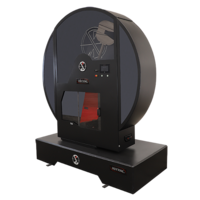
Photo from wikipedia
Self-healing materials can prolong device life, but their relatively weak mechanical strength limits their applications. Introducing tunable metal-ligand interactions into self-healing systems can improve their mechanical strength. However, applying this… Click to show full abstract
Self-healing materials can prolong device life, but their relatively weak mechanical strength limits their applications. Introducing tunable metal-ligand interactions into self-healing systems can improve their mechanical strength. However, applying this concept to solid elastomers is a challenge. To address this need, polyurethane-containing metal complexes were fabricated by introduction of a pyridine-containing ligand into polyurethane, and subsequent coordination with Fe2+ . The strong reversible coordination bond provides mechanical strength and self-healing ability. By optimizing the monomer ratio and Fe2+ content, the resulting complex possesses a very high tensile strength of 4.6 MPa at strain of around 498 % and a high Young's modulus (3.2 MPa). Importantly, the metal complex exhibits an extremely high self-healing efficiency of approximately 96 % of tensile strength at room temperature and around 30 % at 5 °C. The complex is notch-insensitive and the fracture energy is 76186 J/m2 , which is among the highest reported values for self-healing systems.
Journal Title: ChemPlusChem
Year Published: 2019
Link to full text (if available)
Share on Social Media: Sign Up to like & get
recommendations!